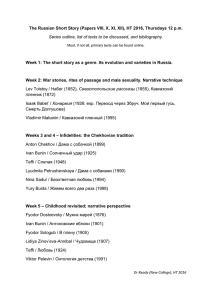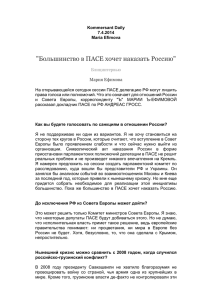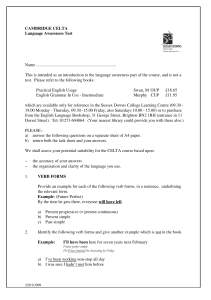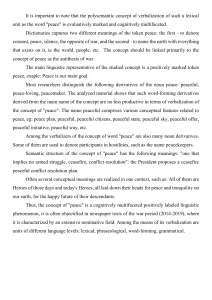Foresight or Hindsight: the Mystery of Russian spoxvatit`sja
advertisement
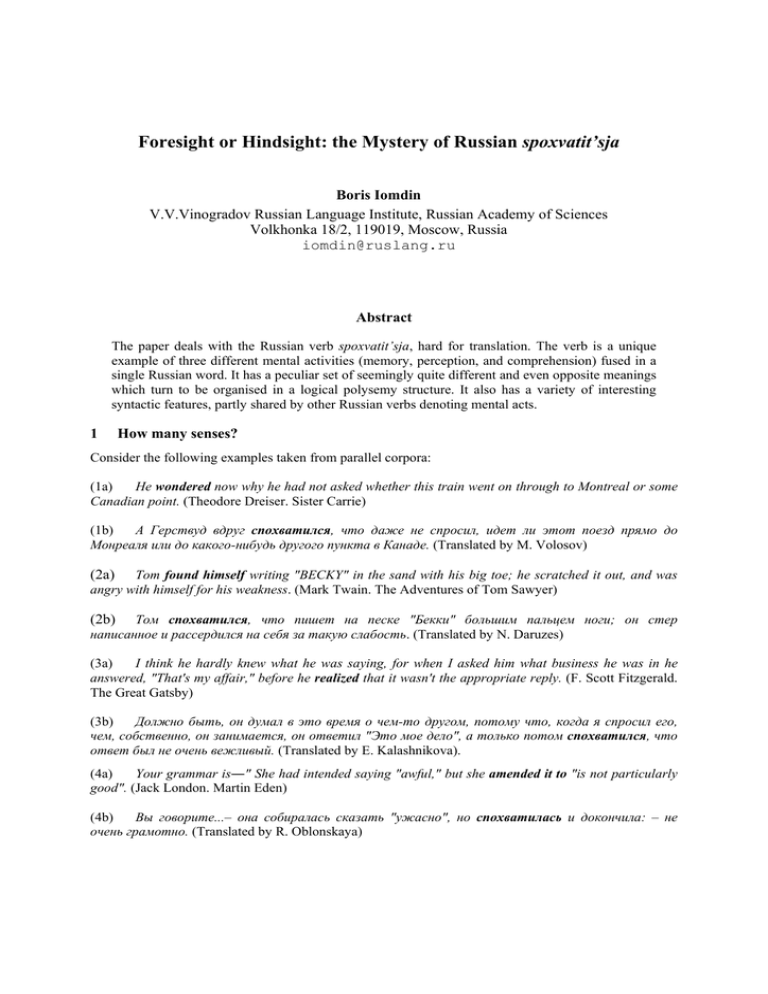
Foresight or Hindsight: the Mystery of Russian spoxvatit’sja Boris Iomdin V.V.Vinogradov Russian Language Institute, Russian Academy of Sciences Volkhonka 18/2, 119019, Moscow, Russia iomdin@ruslang.ru Abstract The paper deals with the Russian verb spoxvatit’sja, hard for translation. The verb is a unique example of three different mental activities (memory, perception, and comprehension) fused in a single Russian word. It has a peculiar set of seemingly quite different and even opposite meanings which turn to be organised in a logical polysemy structure. It also has a variety of interesting syntactic features, partly shared by other Russian verbs denoting mental acts. 1 How many senses? Consider the following examples taken from parallel corpora: (1a) He wondered now why he had not asked whether this train went on through to Montreal or some Canadian point. (Theodore Dreiser. Sister Carrie) (1b) А Герствуд вдруг спохватился, что даже не спросил, идет ли этот поезд прямо до Монреаля или до какого-нибудь другого пункта в Канаде. (Translated by M. Volosov) (2a) Tom found himself writing "BECKY" in the sand with his big toe; he scratched it out, and was angry with himself for his weakness. (Mark Twain. The Adventures of Tom Sawyer) (2b) Том спохватился, что пишет на песке "Бекки" большим пальцем ноги; он стер написанное и рассердился на себя за такую слабость. (Translated by N. Daruzes) (3a) I think he hardly knew what he was saying, for when I asked him what business he was in he answered, "That's my affair," before he realized that it wasn't the appropriate reply. (F. Scott Fitzgerald. The Great Gatsby) (3b) Должно быть, он думал в это время о чем-то другом, потому что, когда я спросил его, чем, собственно, он занимается, он ответил "Это мое дело", а только потом спохватился, что ответ был не очень вежливый. (Translated by E. Kalashnikova). (4a) Your grammar is―" She had intended saying "awful," but she amended it to "is not particularly good". (Jack London. Martin Eden) (4b) Вы говорите...– она собиралась сказать "ужасно", но спохватилась и докончила: – не очень грамотно. (Translated by R. Oblonskaya) In all four occasions, the translators used the Russian word спохватиться for what appear to be quite different meanings. When analysing more contexts with this word, however, we can indeed see that it has all of these meanings (at least). In most traditional Russian explanatory dictionaries, though, no clear distinctions are made. Consider e.g. the definition of спохватиться in (Evgenyeva 1981-1984): “Colloquial. Remember smth. suddenly, discover a committed oversight or blunder”; similar definitions are given in other acknowledged dictionaries of Russian. Bilingual dictionaries treat the verb in a similar way; consider e.g. “(coll.) to remember suddenly, think suddenly” (Oxford Russian Dictionary); “coll. sich besinnen (вспомнить), plötzlich bemerken (заметить)” (Rymashevskaya 1999); “se ressaisir, se reprendre, s'aviser; se rappeler brusquement de qch (вспомнить); s'apercevoir de qch (заметить)” (Shcherba et al. 2002); “coll. caer en la cuenta, darse cuenta (repentinamente); ocurrirse de repente (вспомнить); advertir de repente (заметить)” (Turover & Nogueira 2001). As we can see, the bilingual dictionaries in fact distinguish two different meanings of the verb, labeling them with the Russian synonyms вспомнить ‘to remember’ and заметить ‘to notice’. These two meanings, although not explicitly divided, can also be found in the definition of the explanatory dictionary given above. Indeed, if we consider (1) and (2), we can say that they exemplify these two meanings: ‘remember’ in (1) and ‘notice’ in (2). But does remembering or noticing actually take place in (3) or (4)? A person could not possibly remember that his own reply was inappropriate unless he had forgotten it before, which is clearly not the case in (3). Hardly could he notice it, either, since noticing is paying attention to something as it is happening and not afterwards. Moreover, in (4) the character surely couldn’t remember or notice what she was saying, since she hadn’t said it yet! So, for examples like (3), one could propose the meaning ‘understand’. Here is another example of such usage: (5a) Moreover, as if perceiving at last that if he should give undiluted conscientious advice to Pip, he would be leaving him too wide a margin to jump in for the future, Stubb suddenly dropped all advice. (Herman Melville. Moby Dick) (5b) Вот почему, словно спохватившись, что, давая Пипу советы на совесть, во всей их неразбавленной сложности, он только подсказывает ему оправдание для всех его будущих прыжков в воду, Стабб вдруг прервал свои поучения. (Translated by I. Bernstein) Indeed, Stubb could neither remember that he should not give advice (since he clearly never thought of it before), nor notice it (since it was a new idea that just came up in his own mind). For examples like (4), ‘check oneself’ would be a more appropriate English equivalent. Cf. (6) and (7): (6a) ‘And perhaps you were never even introduced to a lobster–’ (Alice began to say ‘I once tasted–’ but checked herself hastily, and said ‘No, never’)… (Lewis Carroll, Alice's Adventures in Wonderland) (6b) – И, должно быть, никогда не видала живого омара... – Зато я его пробова... – начала Алиса, но спохватилась и покачала головой. – Нет, не видала. (Translated by N. Demurova) (7a) A fire of mingled love and the passion of gambling came into Daylight's eyes. Involuntarily his hand started for his pocket for the coin. Then it stopped, and the light in his eyes was troubled. (Jack London. The Burning Daylight) (7b) Глаза Харниша загорелись любовью и игорным азартом. Рука невольно потянулась к карману за монетой. Но он тотчас спохватился, и взгляд его затуманился. (Translated by V. Toper) 2 Вовремя спохватиться vs. поздно спохватиться In (4), (6), and (7), the verb спохватиться means ‘half doing something undesirable and changing one’s mind in time not to do it’, which is also neither remembering nor noticing. When using the verb this way, speakers of Russian often add the adverbial modifier вовремя ‘in time’; cf. (8) (8a) Having supposed that there was sense where there is no sense, and a laudable ambition where there is not a laudable ambition, I am well out of my mistake, and no harm is done. (Charles Dickens. The Tale of two Cities) (8b) Я имел неосторожность предположить здравый смысл и похвальное честолюбие там, где их нет и в помине, но вовремя спохватился и счастливо избежал ошибки, так что все обошлось как нельзя лучше. (Translated by S. Bobrov & M. Bogoslovskaya) Note that in (8a), no fragment corresponds directly to вовремя спохватиться in (8b): the idea of timely canceling something planned lies in the combination of the gerund (having supposed) and the phrase be well out of in the main clause. This helps us understand the semantic structure of the Russian verb in this sense. It has a presupposition of intending to do something and then understanding that this was undesirable or inappropriate, and an assertion of not doing it. Hence, its presupposition is what the assertion is in (3) or (5). To show this, we can add the negative particle не and see what happens: (9a) Несколько дней спустя Энгельсон, нисколько не думая о том, что он говорит и при ком, сказал: – На такую мерзость способен только немец. Гауг обиделся. Энгельсон уверял его, что он не спохватился, что у него сорвалась эта глупость нечаянно с языка. (А. И. Герцен, Былое и думы) (9b) A few days later Engelson who did not at all think of what he was saying or who was listening to him, said: Only a German could do such a nasty thing. Haug was offended. Engelson tried to assure him that he just did not check himself, that he let the nonsense slip. (Alexander Herzen. My Past and thoughts) (10a) Художник засмеялся и даже не спохватился, что, может, грешно смеяться-то. Не увидел, не заметил, не обратил внимания, какой стоял Смородин… (В. Шукшин, Пьедестал) (10b) The painter laughed and didn’t even realize that it probably was a sin to laugh. He didn’t see it, didn’t notice, didn’t pay attention to how Smorodin looked– (Vassily Shukshin. The pedestal) In (9a), не спохватился means that he did not refrain from saying what he thought inappropriate although he did realize that it was inappropriate, while in (10a), it means that he did not realize at all that laughing was inappropriate. Thus, in (9) the verb is used like in (4), (6), and (7) and means ‘check oneself’, while in (10) it is used like in (3) or (5) and means ‘understand’. Levontina (2004) notices that the adverb вовремя [‘in time’] very often modifies verbs that describe situations when one is planning to do something or starts doing it, but later decides not to do it: спохватиться, одуматься [‘think better of it’], сдержаться [‘restrain oneself’], прикусить язык [‘bite one’s tongue’]. Note, however, that one can also say поздно [‘tardily, too late’] спохватиться, but not *поздно сдержаться <удержаться [‘refrain’], прикусить язык>. This is due to the fact that сдержаться, удержаться, прикусить язык mean ‘resist the temptation to do something inappropriate’, and a combination of this meaning with ‘too late’ leads to a semantic paradox. At the same time, поздно спохватиться is perfectly standard, since here спохватиться means ‘realize’. Cf. 11: (11a) That was the other thing. No cigarettes. Oh well. Too late now. I'll do that tomorrow. (Helen Fielding. Bridget Jones's Diary) (11b) Вот еще чего нельзя. Никаких сигарет... Ах, черт, ладно. Поздно спохватилась. С завтрашнего дня брошу. (Translated by G. Bagdasaryan) We observe here an interesting assymetry. Normally, вовремя is opposed to рано ‘too early’ or поздно ‘too late’, cf. (Levontina 2004: 112). One can say рано приехать ‘come too early’, вовремя приехать ‘come in time’ or поздно приехать ‘come too late’. With verbs like сдержаться or удержаться, only вовремя can be used, since their semantic representations include the meaning ‘in time’: they contain the idea of changing one’s mind after one thinks of something, but before he actually does it. And with спохватиться, one can say both вовремя спохватиться and поздно спохватиться, but the verb would mean different things here (unlike приехать in the examples before, which means ‘come’ in all of them). Moreover, in highly colloquial speech one can even say рано спохватиться, which would mean the same thing as вовремя спохватиться; cf. 12: (12a) Доктор наш нами (нашим прогрессом в лечении) очень доволен. Говорит, что молодцы, что рано спохватились (From a medical web forum). (12b) The doctor was much satisfied with us (with the progress of the treatment). He tells us that we did a great thing that we reacted early. Here, рано спохватились does not mean ‘realized earlier than needed’, but ‘identified the disease and visited the doctor before it was too late’. Interestingly, the peculiar phrase can also be used in its direct meaning: in (13) the Russian translator of a short novel by John Collier uses it to convey the irony of the speaker, who blames his friend for noticing fire and putting it out before his old house burns down and he gets the insurance: (13a) “Angry!” Said Mark laughing. “We are though, for putting it out. Why didn’t you let the confounded place burn down? (John Collier, Great possibilities) (13b) – Нет, мы очень на вас сердиты – за то, что вы рано спохватились. Дали бы этому постылому домине спокойненько догореть. (Translated by M. Makarov) 3 Four senses: the invariant and the differences We have seen that beside the meanings of ‘remember’ and ‘notice’ given in the dictionaries, the verb спохватиться has at least two other meanings: ‘understand’ and ‘check oneself’. But can we say that all dictionaries are unaware of these two meanings or that these meanings have nothing to do with those described by the definitions? Not really. In fact, all the uses of the verb that we have analysed have much in common. They share the following semantic components: (a) ‘undesirable situation for which the subject is to blame’: this is conveyed in the dictionaries by words like упущение ‘oversight’, промах ‘blunder’, etc. (b) ‘idea of this situation coming into the subject’s mind’: the dictionaries put it as вспомнить ‘remember’ or обнаружить ‘notice’. (c) ‘fact that the situation has to be dealt with before it’s too late’. The differences lie in how these components are organized in the semantic representation of each lexeme of спохватиться. Below, tentative definitions are proposed for each of the lexemes: Sense 1: ‘A person suddenly remembered something and realized that an undesirable situation, into which s/he should have intervened earlier, has been taking place’. Sense 2: ‘A person suddenly discovered something and realized that an undesirable situation, into which s/he should have intervened earlier, has been taking place’. Sense 3: ‘A person suddenly understood something and realized that an undesirable situation, into which s/he should have intervened earlier, has been taking place’. Sense 4: ‘Having realized that an undesirable situation is going to happen if the person does what s/he has been intending or starting to do, do something else instead’. We can see that, basically, there are two points in which these meanings differ: (i) why the idea of the undesirable situation comes into the subject’s mind (by recollection, discovery or comprehension of something) and (ii) when it comes to him (before the situation has developed or only afterwards). This brings us to two interesting observations. 4 Semantic observation: спохватиться as a unique amalgam of mental activities The first opposition provides us with a very interesting example of three different mental activities (memory, perception, and comprehension) fused in a single Russian word. The idea that, in the linguistic picture of the world, these subsystems of our mind work in close cooperation is not new (for Russian, see e.g. Apresjan 2001, 2008; Arutjunova 2000; Bragina 2007; Dmitrovskaja 1988, 1991; Iomdin 2006, Iomdin to appear; Kubryakova 2004; for other languages, many interesting observation and further bibliography in Language of Memory 2007), but it has hardly ever been mentioned that one and the same word can express the meanings of ‘remember’, ‘discover’, and ‘understand’. Moreover, in some examples one could hardly distinguish which of the meanings should be attributed to the verb usage. Cf. (14a) – Заболталась, а вы есть хотите, – спохватилась повариха. (А. Рыбаков, Дети Арбата) (14b) I keep talking, and you are hungry, – the cook interrupted herself. (Anatoly Rybakov. Children of the Arbat) (15a) Они успели проехать несколько кварталов, когда она вдруг спохватилась: – А куда, собственно говоря, ты меня везешь? (А. Маринина, Мужские игры) (15b) It was not until they had passed several blocks that she suddenly exclaimed: Hey, where are you driving me to? (Alexandra Marinina. Male games) Did the cook in (14) remember that people she spoke to were hungry, or did she understand it from their looks, or did she just glance at the clock? Did the woman in (15) remember a plan, or did she understand that something unforeseen was happening, or did she notice that the she was being driven along unknown streets? All this is unclear from the verb спохватиться and could only be understood in a broader context. 5 Syntactic observation: government patterns The differences in the semantic representations correspond to the differences in syntactic features, namely the valency structure and government patterns. Спохватиться can have two different valency structures. In senses 1, 2, and 3, it has two semantic actants: A1 ‘Subject’ and A2 ‘Situation’. Syntactically, the Subject is expressed in trivial ways, while the Situation valency can be instantiated by a sentence, either introduced by the conjunction что (consider examples 1, 3, 5, 9, 10) or without it, as a direct speech (either before the verb, as in 14, or after it, as in 15). In sense 4, the verb has another semantic actant: A3 ‘Action of the Subject’ (e.g. what the Subject did instead of the action he refrained from). Surprisingly enough, this valency cannot be instantiated in ordinary ways, such as a noun phrase in the Instrumental case (with or without prepositions): one cannot say *спохватиться ответом <молчанием, кивком головы> [literally ‘by a reply, by silence, with a nod’] nor *спохватиться в приветствии <в извинении> [literally ‘in welcoming words, in an excuse’], as one says отреагировать молчанием <кивком головы, письмом> [‘react by silence <with a nod, by a letter’], выступить с приветствием <с извинением> [‘make a welcome <apologetic> speech’]. Neither can one implement this actant by a clause: *спохватиться тем, что P. The only two ways of instantiating this valency are the following: (a) introducing it with и ‘and’: cf. спохватилась и докончила in (4), спохватилась и покачала головой in (6), or спохватился и счастливо избежал ошибки in (8). (b) putting the verb спохватиться into a gerund clause and expressing the valency A3 by the main clause, as in (16): (16a) Лиманский машинально потянулся к уху, намереваясь поправить несуществующую дужку, но, спохватившись, сделал вид, что почесывает затылок. (Е. Прошкин, Механика вечности) (16b) Limansky absent-mindedly reached out for his ear to adjust the non-existent earpiece, but catching himself pretended that he was scratching his head. (Evgeny Proshkin, Mechanics of eternity) These two exotic ways of instantiating a valency were first described by Igor Boguslavsky for verbs изловчиться ‘contrive, manage somehow’, поднатужиться and поднапрячься ‘to make big efforts and succeed’. Cf. (17a) Шариков в это время изловчился и проглотил водку; – У самих револьверы найдутся… – пробормотал Полиграф, но очень вяло и вдруг, изловчившись, брызнул в дверь (М. Булгаков, Собачье сердце) (17b) Sharikov seized this moment to gulp down his vodka; You're not the only one with a revolver… muttered Poligraph quietly. Suddenly he dodged and spurted for the door. (Mikhail Bulgakov, The Heart of a Dog, translated by Michael Glenny) Boguslavsky also mentions that this usage is possible in other languages, including English and Swedish: (18) We were too hungry even to try and think of anything except food. (George Orwell, Down and out in Paris and London) (19a) Var så god och svara på frågen (19b) Please answer the question, literally ‘Be so good and answer the question’ (Boguslavsky 1996: 28–32). Note that the verbs described by Boguslavsky denote physical actions, while спохватиться is a mental act. It turns out that there are at least two other mental verbs for which this government pattern is the only possible one: these are забыться ‘forget oneself’ and зазеваться ‘stand gaping, let one’s thoughts wander and miss something’. Cf. (20a) Забывшись, я по трактирной привычке принялся вытирать тарелку салфеткой. (М. Шишкин, Всех ожидает одна ночь) (20b) Forgetting myself, I started to wipe the plate with a napkin as if I was in a local. (Mikhail Shishkin, One night awaits everyone) (21a) Зархи не любил свежую зелень в супе, и ЛЮ каждый раз боялась забыться и бросить ему щепотку укропа. (В. Катанян, Лиля Брик) (21b) Zarkhi did not like fresh herbs in his soup, and LY always feared that she would forget herself and throw in a pinch of dill in his plate. (Vassily Katanyan, Lilya Brik) (22a) Маша, зазевавшись, однажды угодила ногой в один из капканов. (А. Мусатов, Стожары) (22b) Walking and gaping, Masha once got her foot right into the trap. (Alexey Musatov, Stozhary) (23a) На севере Юты мы зазевались и проскочили нужный нам поворот. (В. Песков, Б. Стрельников, Земля за океаном) (23b) Traveling somewhere in Northern Utah, we were nodding and missed the right turn. (Vassily Peskov & Boris Strelnikov, The land overseas) In these two verbs, the valency in question does not express a desirable situation (as in спохватиться or in Boguslavsky’s examples), but an undesirable one. In (Iomdin, to appear) we propose the following definitions for these verbs (A2 is the valency in question): Забыться ‘The person A1, ceasing to be aware of conditions that have to be observed in the current situation, violated them by doing A2’ Зазеваться ‘Having focused on something unrelated to the current situation, the person A1 failed to notice something important happening, which caused an undesirable situation A2’ Moreover, for the Russian verb вспомнить ‘to remember’, the semantic valency of Content can not only be instantiated in standard ways (most of which are impossible for спохватиться1), cf. вспомнить дату <число, лицо> ‘remember the date <number, face>’, вспомнить о невыполненном обещании <про полученное письмо> ‘remember about the unfulfilled promise <about the received letter>’, он вспомнил, что надо было позвонить отцу <где лежат деньги> ‘he remembered that he had to ring his father <where the money was>’, but also using the construction with the conjunction и ‘and’; cf. (24a) Я даже ждал, что Алексей однажды позвонит. Просто вспомнит и позвонит. (В. Маканин, Андеграунд, или герой нашего времени); (24b) I even expected that Alexey would once call me. That he just remembers to call. Vladimir Makanin. Underground, or a hero of our time) (25a) Потом, стоя уже в прихожей, чтобы закрыть за ним дверь, она вспомнила и попросила его ввинтить лампочку в ванной. (А. Кабаков, Девушка с книгой, юноша с глобусом, звезды, колосья и флаги). 1 In older dictionaries one can find examples of the transitive usage of the verb, cf. Спохватилась мачеха пасынка, когда уже лед прошел [‘The stepmother did not miss her stepson (who presumably drowned in winter) until the ice drifted’], but this usage is now obsolete, and one should say хватиться ‘miss, notice the absence’ instead. (25b) Then, already standing in the entryway, she remembered she meant to ask him to fix a lamp in the bathroom. (Alexander Kabakov. A girl with a book, a boy with a globe, stars, ears of grain and flags. Translated by Natasha Perova) This is possible if one speaks about remembering a necessity (to ring, as in (24), or to ask to change the bulb, as in (25)). Here, вспомнить и сделать A2 [literally ‘remember and do A2’] means ‘having remembered that A2 had to be done, do A2’. This construction is symmetrical to its opposite, a far more standard construction забыть сделать A2 ‘having forgotten that A2 had to be done, not to do A2’, cf. (26a) Доктор, эти господа, вероятно, второпях, забыли положить пулю в мой пистолет. (М. Ю. Лермонтов, Герой нашего времени) (26b) Doctor, these gentlemen have forgotten, in their hurry, no doubt, to put a bullet in my pistol. (Mikhail Lermontov, A hero of our time. Translated by J. H. Wisdom & Marr Murray) Anna Zalizniak argues that the English sentence I remembered to ring Bill cannot be literally translated, since the verb вспомнить is impossible here: one cannot say *Я вспомнил позвонить Биллу but can only say Я не забыл позвонить Биллу ‘I did not forget to ring Bill’. Zalizniak explains this difference of English and Russian usage by the fact that “Vspomnit’ implies that the object was forgotten for a certain period of time (a semantic component which is absent from I remembered to ring Bill)” (Zalizniak 2007: 99). However, it seems that this component is not necessarily contained in the meaning of вспомнить. It can be absent if one speaks about imagining an object or person which has never disappeared from one’s memory. Cf. (27a) He got back in fancy to the old Hurstwood, who was neither married nor fixed in a solid position for life. (Theodore Dreiser. Sister Carrie) (27b) Он вспомнил свою молодость, когда он еще не был женат и не имел еще прочного места в жизни. (Translated by M. Volosov) Besides, it seems that this semantic component can be present in the English construction as well, cf. (28): (28) Suddenly I remembered to ask Stephen how he'd found me (Gabrielle Roy, Enchantment and sorrow. Autobiography of Gabrielle Roy). So, in this situation one does use вспомнить, if the Content valency is instantiated using the conjucntion и: Я вспомнил и позвонил Биллу [literally ‘I remembered and rang Bill’]. Cf. also (29), when this construction is used twice, both for спохватиться and for вспомнить: (29a) Ты вдруг спохватишься и вспомнишь и успеешь меня поздравить с днем Химика (А. Битов, Письмо). (29b) You would suddenly think and remember and congratulate me in time on Chemist Day. (Andrey Bitov, A letter) 6 Conclusions We have seen that the seemingly very different meanings of спохватиться have in fact much in common. Taking into account its semantic and syntactiс properties (the semantic emphasis on realizing that an undesirable situation could or did happen rather than on how exactly it was realized, different presuppositions and assertions and government patterns), one could sum up the usage of the verb into two different meanings (or lexemes, in the sense of Moscow Semantic School), but not those two provided by the dictionaries. We propose the following definitions for these lexemes: Спохватиться 1: ‘A person A1 suddenly realized that an undesirable situation A2, into which s/he should have intervened earlier, has been taking place’. Спохватиться 2: ‘A person A1, having realized that an undesirable situation A2 is going to happen if A1 does what s/he has been intending or starting to do, does A3 instead’. Such a set of meanings, as it seems, is quite interesting and not common for other European languages. Still we would refrain from drawing any conclusions for the uniqueness of the Russian linguistic picture. The idea of realizing something too late, conveyed by the first lexeme, can also be expressed by the idiom задним умом крепок [‘wise behindhand’, literally ‘strong with the hind mind’], and is also typical for Polish (mądry Polak po szkodzie), Czech (pozdĕ bycha honí, mysli mu to až třeti den), Bulgarian (късно му идва умът), English (wise after the event, it is easier to have hindsight than foresight, deathbed repentance), German (die besten Gedanken kommen hinterher, hinterher sind alle Dummen schlau), French (l'esprit de l'escalier), Spanish (es estratega a posteriori), Italian (dietrologìa, del senno di poi ne son piene le fosse, il giudizio vien tre giorni dopo la morte, dopo il fatto ognuno è savio), and probably many other languages; see also (Zelenin 2002). The second lexeme can also be quite easily translated into most languages. It is the combination of the two in one and the same word that makes it worth analyzing.2 Acknowledgements This work was done with a support by the Program of Fundamental Research “Genesis and interaction of social, cultural, and linguistic communities” of the History and Philology Department of Russian Academy of Sciences and by the Russian President grant for the Support of Leading Scientific Schools No. НШ-3205.2008.6. Examples from the National Corpus of Russian Language (www.ruscorpora.ru) were used. References Amberber, Mengistu (ed.) 2007. The language of memory in a crosslinguistic perspective. John Benjamins Publishers. Apresjan, Juri D. 2001. Системообразующие смыслы ‘знать’ и ‘считать’. In: Russkij jazyk v nauchnom osveschenii. No.1:5–26. [The system forming meanings ‘know’ and ‘believe’. In Russian.] Apresjan, Juri D. 2008. Systematic Lexicography. Oxford University Press. Arutjunova, Nina D. 2000. Знать себя и знать другого (По текстам Достоевского). In: Slovo v tekste i v slovare: Festschrift for the 70th anniversary of Juri Apresjan. Moscow. Shkola “Jazyki russkoj kul’tury”. [Knowing oneself and knowing another person. Based on Dostoevsky texts. In Russian.] Boguslavsky, Igor M. 1996. Сфера действия лексических единиц. Moscow. Shkola “Jazyki russkoj kul’tury”. [The scope of lexical units. In Russian.] Bragina, Natalya G. 2007. Память в языке и культуре. Moscow. Jazyki slavjanskix kul’tur. [Memory in language and culture. In Russian.] Dictionary of Russian Folk Dialects. 1999. Ed. 33. S. Petersburg. Nauka. 2 Amusingly enough, the peculiar combination of meanings corresponds to the combination of prefixes (с- and по-), both with a perfective meaning, which is very uncommon for Russian. For the first meaning, it would be more natural to use the prefix проwhich can mean ‘do something unimportant and miss the main thing’, cf. прозевать, проморгать, прохлопать, прошляпить, проворонить. And, indeed, one finds the word прохватиться in Russian dialects; cf. Прохватился брат, да поздно [‘The brother thought better of it but it was too late’] (Dictionary of Russian Folk Dialects: 24). Dmitrovskaya, Maria A. 1988. Знание и достоверность. In: Logicheskij analiz jazyka. Pragmatika i problemy intensional’nosti. Мoscow. Institute of Oriental Studies, Russian Academy of Sciences. 166–188. [Knowledge and veracity. In Russian.] Dmitrovskaya, Maria A. 1991. Философия памяти. In: Logicheskij analiz jazyka. Kul’turnye koncepty. Мoscow: 83–92. [Philosophy of memory. In Russian.] Evgenyeva, Anastasia P. 1981–1984. Dictionary of Contemporary Russian Language. Moscow. Russkij jazyk. Iomdin, Boris L. 2006. Языковая модель понимания. In: Jazykovaja kartina mira i sistemnaja leksikografija. Ed. by Juri D. Apresjan. Moscow. Jazyki slavjanskix kul’tur. 515–612. [Linguistic model of comprehension. In Russian.] Iomdin, Boris L. To appear. Ментальная лексика: память и ее функционирование. In: Aktivnyj slovar’ russkogo jazyka. Prospekt i slovnik. Ed. by Juri D. Apresjan. [Mental lexicon: memory and how it functions. In Russian.] Kubrjakova, Elena S. 2004. Язык и знание. Moscow. Jazyki slavjanskix kul’tur. [Language and knowledge. In Russian.] Levontina, Irina B. 2004. Вовремя, своевременно. In: Novyj ob”jasnitel’nyj slovar’ sinonimov russkogo jazyka. Ed. by Juri D. Apresjan. 2nd edition. Moscow. Jazyki slavjanskix kul’tur. Wien. Wiener Slawistischer Almanach. 112–115. [In time, timely [a series of synonyms]. In Russian.] Oxford Russian Dictionary. 2007. Oxford University Press. Rymashevskaya, Emilia L. 1999. Modernes Deutsch-Russisches Wörterbuch. Moscow. Russkij jazyk. Shcherba, Lev V., Margarita I. Matusevitch, & Sofya A. Nikitina. 2002. Grand dictionnaire russe-français. Moscow. Russkij jazyk. Turover G. Ya. and J. Nogueira. 2001. Gran diccionario ruso-español. Ed. by G. Ya. Turover. Moscow. Russkij jazyk. Zalizniak, Anna A. The conceptualization of remembering and forgetting in Russian. In: The language of memory in a crosslinguistic perspective. Ed. by M. Amberber. John Benjamins Publishers. 97–18. Zelenin Alexander. 2002. Русские задним умом крепки. А другие народы? Фразеологизм как отражение национального характера. In: Russkij jazyk za rubezhom. No.2:45–50. [The Russians are wise after the event. What about other nations? The idiom as a reflection of national character. In Russian.]
